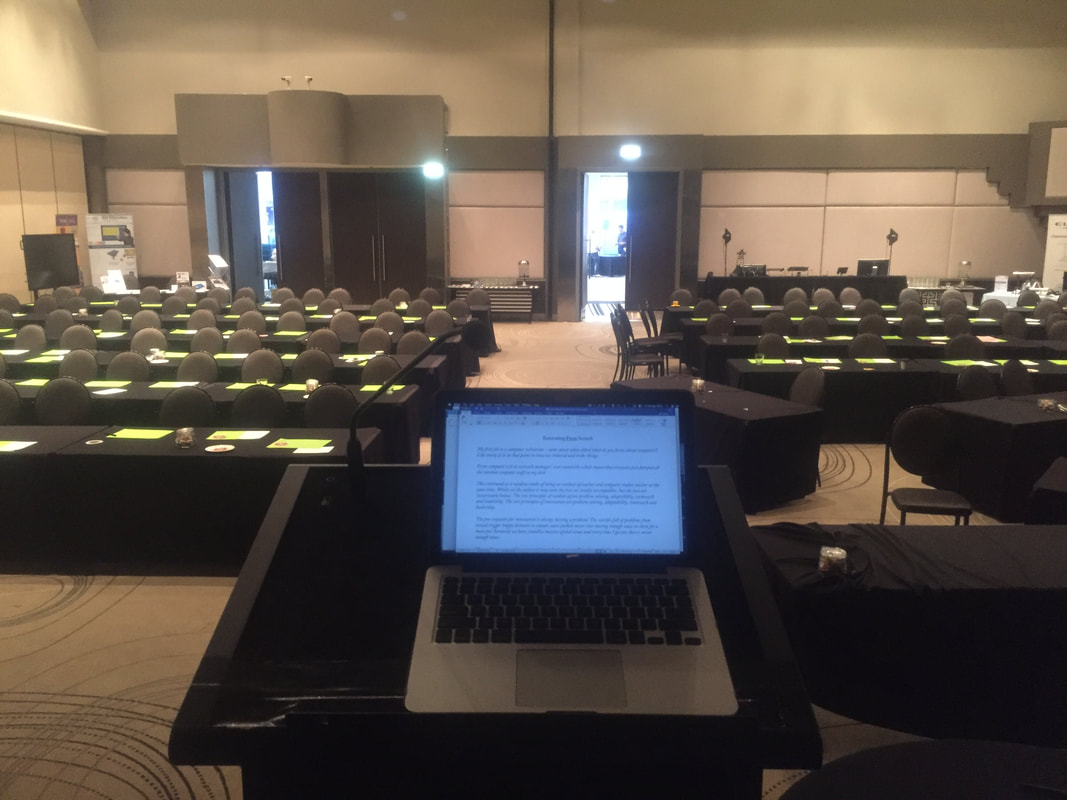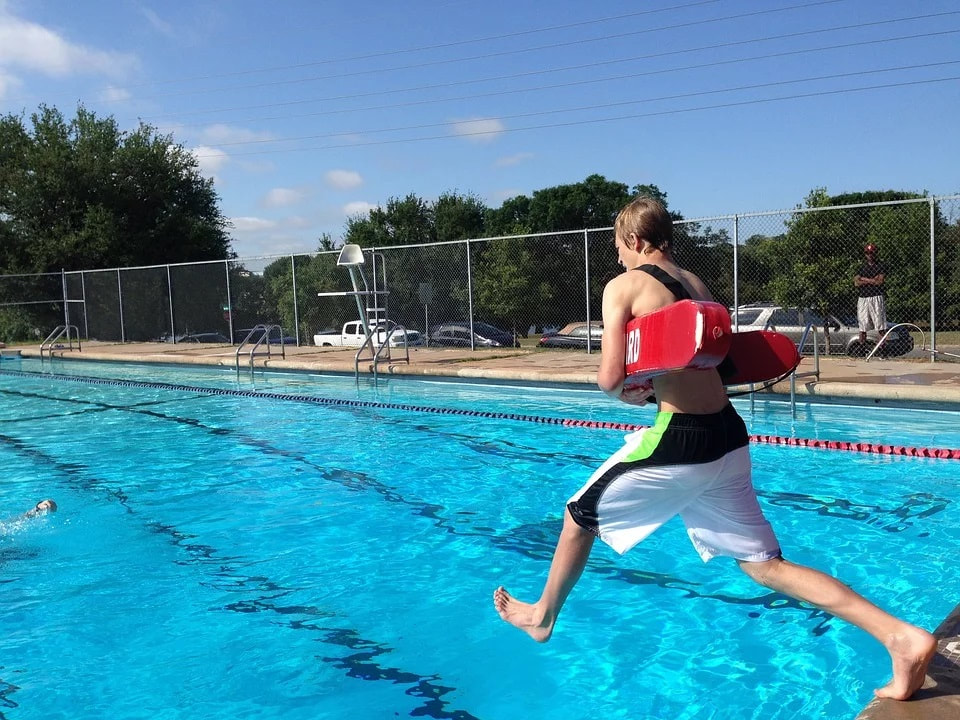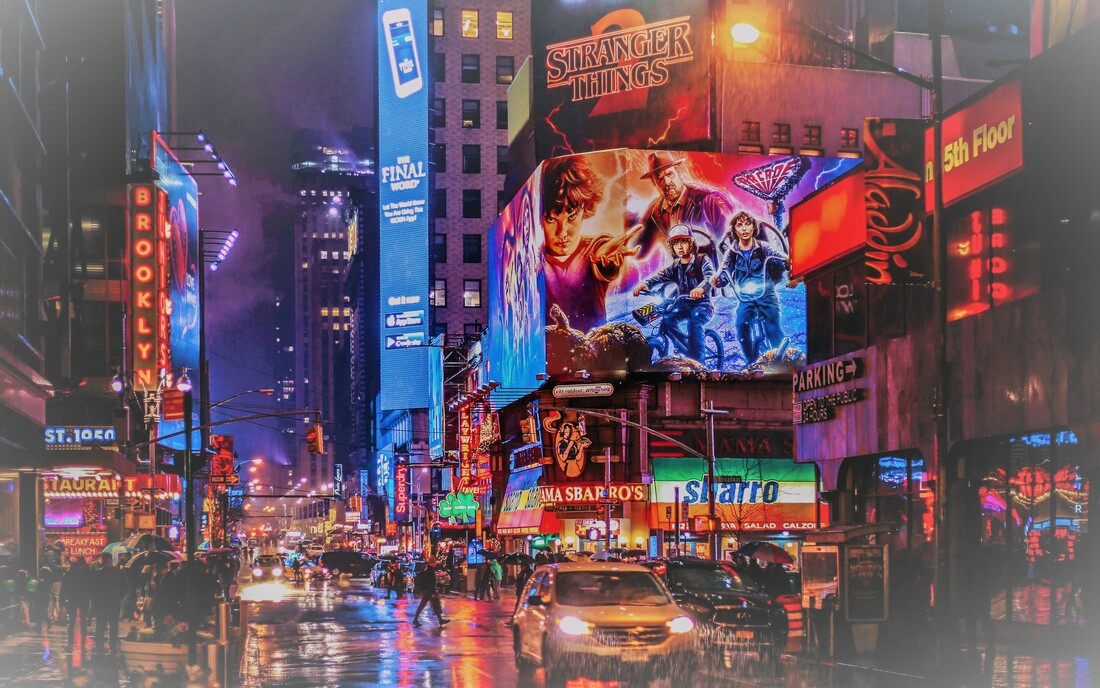|
Recently, I’ve been speaking at a number of different conferences, some education, some tech, some business. The challenge with each is to come up with a unique and interesting presentation that will be engaging and beneficial to the audience. With three quite different audiences, you can’t just do one presentation and expect it be suitable for everyone. Instead, you need to understand your audience and through doing so, shape your presentation so that it’s beneficial to them. After all, the presentation is not about you or for you. It’s for them! You are merely acting as the guide to help them learn and lead them on their own path, (very Jedi in training style).
With that in mind, the first thing you need to do is research your audience. What’s their background? What interests do they have? What expectations might they have in going to a conference or going to hear someone speak? When you understand the needs of your audience, you now have a platform from which to build a useful presentation. If it is a conference, there’s often a theme to it, which is also important to recognise. If you’re presenting something that’s way outside this theme, it can be disjointed and can fail to meet the expectations of those attending. However, if you can, it’s also worth looking at what other speakers are covering and avoiding repetition as that can be problematic too and your presentation has to be way better than theirs. Once you have a couple of the basics sorted, then it’s time to put together some of the following, so that it’s engaging and interesting and so that your audience doesn’t feel like throwing the free pens at you. Consider the following: Experience – anecdotal evidence and personal experiences told in an interesting way can be a fantastic way to engage the audience and hold attention from the outset. The more interesting you can be, the more effective your presentation will come across. Start with a story to get everyone involved. At one conference, I started with the story of the student who took a superman dive in a bed of oysters… At this point they’re either excited to hear what happened next, or cringing and wanting you to stop… Don’t stop, it’s too late already for that! Linkages – Build this story and have a point to it. Link it back to the theme topic or core problem your experience or knowledge-base of the audience would have already. For example, if you’re talking about how you innovated to a group of businessmen and women, link this back to how this process of innovation can be replicated in their businesses. If you’re talking about how a student managed to superman dive into a bed of oysters, then link it back to student management, risk management and first aid. The linkages provide a clear and relevant connection with how this information could be useful to participants. Powerpoints Slides – The best thing to do if you have a power point or keynote “thingy” to go with your presentation is to just have a single image or a slide with a couple of key bullet points - nothing more! Most importantly, don’t read your slides!!!! This annoys people and they will start throwing the pens at you. Hence, don’t do it, unless you’re prepared for the incoming volley. Longer Presentations & Workshops – The longer the presentation, the more important it is you vary it up and add in practice activities or group discussions from which the audience can interact with each other and have a break from the presenter. Again, it’s because the session is about them and not you that this is so important. Link the activity and the results of that, back into your presentation. Practise – Before doing your presentation you need to practise it! Stand in front of a mirror and run through your speech. Know how each section should run and for how long it should run. There’s always an intro, a main body and a conclusion and you will always have a time limit. Practise it and stick to your time limit. Be prepared to drop sections on the run if you have to cut down on the time to ensure you finish the session on time. Practice also enables you to have better contact and engagement with the audience. Eye Contact – This is critical! Eye contact is about building trust and building a relationship. If you want people to trust you and what you’re saying, you need to be able to engage with them effectively and let them see your eyes. If you’re just reading off a piece of paper, this breaks the relationship and is ineffective. Look around the room. Make a point of presenting to each part of the room as you scan throughout the presentation. Nobody knows what you’re going to say, but people quickly understand how you’re going to say it, if you don’t make eye contact with them. Again, the risk of pens flying at you is a real possibility. Powerful Conclusion – Many presentations fizzle out. They lack a punch. They lack a point. They lack a powerful action step moving forward. Think about what is a really important take away for your audience! Are they looking to upskill on a certain topic or area? Are they worried about something that’s new in terms of legislation, responsibility, legal duty or a new way of doing something or thinking that they’re now willing to try? If so, challenge them to do this. Take action, take a risk, do something about it. Again, it comes down to the fact that the presentation is about the audience and improving their lives, not about you. Leave them with something to think about and get moving on to actually do. If you can build these few steps into a presentation that you’re doing, then you’ll be way ahead of most presenters already and you won’t have to protect yourself from the flying pens. If these pointers aren’t enough or too much, then just think of it this way. If someone’s given up 30 minutes of their time to listen to you speak, then you need to make that 30 minutes of their life a valuable and memorable one. Nobody remembers boring speakers, so don’t be a boring speaker. Make it fun, make it worthwhile and make it memorable. Because if you can do that, then that’s a session I want to be sitting in and listening to you.
0 Comments
Recently, I was working on a residential program and despite students needing to have a phone on them for our risk management as part of the program, we collected everyone’s phones at night. Now this was something which had wide spread support of parents and limited support from students. No surprises there with the Pandora’s box that’s been opened on that front, which is the point of this article.
Whilst many students thought I was the worst person in the world for taking their phones every night, it made me realise something which I suspected, but didn’t quite have the evidence to support it until now. The phones generally went on charge before homework time in the evening around 7:30 and after prep, bedtime was around 9:45 with lights out at 10pm. With all the phones being recharged in the duty office overnight, I noticed something when I went back to wrap things up for the evening. Depending on what time all the students were settled, I’d generally head back into the office somewhere between 10:30 and 11pm. Sitting there, writing up the daily notes for the next day’s handover, I’d hear the buzz, bings and blips of the fifty odd phones going off the whole time I was there. To begin with, it was just annoying, but it became progressively more concerning. One evening, I was up past midnight and the phones were still going. This gave me the sudden realisation of how overwhelming this must be for their minds. Phones are already addictive by nature. This helps us to understand the ongoing problem that teenagers are facing with the inability to switch off from the connected world. If their phones are still alive with notifications late at night and I mean every night, not just weekend, every single night, what chance do they have to be able to cope in class with tiredness and a constant craving for another dopamine hit. Like coked up lab rats, they become slaves to the device that’s shaping and manipulating their behaviour almost every hour of the day. This is bound to be slowly destroying their ability to cope with the real world and doing unknown long-term emotional damage. Yet parents are still giving their children phones at a phenomenal rate. We have well and truly thrown in the towel on this one in such a short period of time. We need to pick up that towel and get back in the ring. This is something worth fighting for as large social media companies care nothing for their users and everything about their profits. These companies have built intentionally addictive functionality into their platforms to keep people online and this is the result, endless distractions designed to manipulate the formative years of children. When you see this toxic mess for what it really is, it makes you wonder about the world 2.0 and how regressive social media has been for us. Digital technology is amazing, but we still need everyone to have the opportunity to switch off from it and not be constantly bombarded with messages, notifications and whatever other crap comes through their phones. Despite the large tech companies doing nothing but giving lip-service to social responsibility, we have a responsibility to help students switch off from this potentially dangerous and destructive world and provide them with the opportunity to understand the life and circumstances in which they find themselves living. It’s time we gave them the opportunity to switch off and build real relationships with real people and not just be mindless slaves, slowly losing their sleep and minds to the wonderful machine that goes bing. Working in risk management, this is one of my biggest concerns and ongoing frustrations. Why don’t people take action, manage and reduce risk until it’s too late? Far too many schools and organisations wait until they’ve had a major incident to ensure they have systems in place and the right people in place to manage risk.
Why is this? Are we all wired to think that everything is going to be ok and run exactly to plan? Is it the unconscious incompetence that comes with being new to something? Or is it not really caring? To be honest, I really don’t think it’s not caring. Generally, people are in education to help others achieve goals and consequently tend to care about what happens as a result. However, the focus of teaching and teacher training is on classroom practice and although many lessons don’t go to plan, there’s not really a need to mitigate against this risk other than to make sure you plan your lesson. Yet when planning an excursion, trip, activity or sport outside of the classroom, the same level of preparation rarely goes into it. The problem is that the management of risk and the actual risks inherent to the activity, excursion or sport is rarely understood, especially if the main focus of someone’s training and employment has been unrelated. Just because someone can teach and manage a group in the classroom, doesn’t mean he or she can facilitate and manage a group in an unstructured and unregulated environment. The result of this usually ends up with most things going to plan, but when something doesn’t, it can go pear-shaped very quickly and generally when this happens, the response is just made up as they go. This can exacerbate a problem or an incident and needlessly escalate it, which can result in further damaging consequences for staff and students. Once a teacher, administrator, school or organisation has gone through this experience, they then suddenly start to think about risk management in a meaningful way. However, this is too little, too late. The horse has already bolted and it’s not coming back. The first school I worked for unfortunately had to go through a fatality for them to realise that they had a risk management problem. I was one of the new staff employed after the fatality and the fall out from this lasted for years for some and a lifetime for many others. Whilst a fatality is thankfully a very rare occurrence, there’s many other incidents which still regularly occur that are completely preventable. There’s enough knowledge, experience and technology available to prevent so many incidents from occurring year, so why don’t people do anything about it until it’s too late? More often than not, it’s what’s referred to as unconscious incompetence. You don’t know what you don’t know. How can someone be expected to manage something, if they have no idea about what they’re managing nor why they’re supposed to be managing it. All programs and activities start with good intentions to create great educational outcomes. However, good intentions don’t always translate to good management. Therefore, specific training is essential in general risk management for school activities, sport and excursions, as well as more focussed individual activity risk management training. This sort of initial training helps move people from the unconscious incompetence, to the conscious incompetences skill level and can be quite confronting and eye-opening for most people. Suddenly, they realise the holes, gaps and risks in the programs for which they’re responsible and start to do something about it. Experience and further training at this stage then moves a person from this conscious incompetence stage into the conscious competence stage. At this point, the person understands risks, controls them and continues to actively manage and work towards risk management goals and develop a culture of risk management within their organisation. It’s at this point you actually get good risk management systems operating within schools and organisations to ensure quality practices are always in place and being used to run great educational programs with the risks minimised. The final stage persons is unconscious competence. Essentially, they understand a whole range of risks and actively manage them without thinking. If you don’t have anyone in your school or organisation like this, with this skill set, then you’re just treading water before something terrible happens. This shouldn’t be the case as again, there’s enough knowledge, experience, training and technology available to ensure risks are well managed within any organisation. It’s way too late to do this after something has failed and you can be assured that dealing with a crisis and the fall out from that is far more difficult than a bit of training and implementing good risk management systems. To avoid the inevitable train wreck of a situation in which lives, careers and reputations are damaged, get some risk management training today so you can build and leverage the right systems, processes, equipment and technology to consciously and competently manage risk within your school or organisation. With the current global virus worries, there’s been a dramatic shift in people’s approaches to work, shopping and education. Now I’m not going to comment on the virus itself, because everyone in the world seems to have already commented and these range from everything from good, preventative measures to mass fear and panic.
However, the net result is that many people are now working from home. Over the past few years, businesses have tried this for some of their staff and shifted their opinion and approaches back and forth depending on who’s running something and how much control they need over their employees. One place I worked, the director there was so paranoid about people potentially not doing things, there was no way anyone could work from home, ever. He would rather have (and did have) countless people sitting in the office chatting and doing nothing, than the fear of letting someone work remotely and get the job done in half or even a quarter of the time. Now admittedly not everyone can work from home, nor should they work from home in many roles. However, there are many people who can and the office these days for many is just a luxury, indulgence, or historic relic of working days past. If you have any sort of administrative role, tech-role or anything which can be done via a phone, video or computer, then the ability to work remotely makes perfect sense and can save a lot of time, energy and pointless expense. If I look at some of the work I do when organising a program, it’s 95% able to be done remotely. When I run a program, I need to be there in person throughout. However, let’s look at the other side and the things which can be done from anywhere and anytime. Whilst I’ve been doing a lot in person, setting up lots of meetings and travelling a lot, these meetings can often not have a great purpose other than building relationships, an aspect which is also very important. However, once you’ve built a number of relationships, there’s no pressing need to have regular meetings in person and much of what can be achieved in an hour-long face to face meeting, could be done in a 5min phone call. Whilst this isn’t anything new, I’ve found that due to the sudden change of work recently, my commute has been reduced from about 1.5 hours a day to nothing. This gives me another 1.5 hours to either do something constructive or go for a run or do something more interesting than sitting in traffic and getting frustrated with slow drivers. The sudden departure of tens of thousands of people from our cities was notable the other day when I was driving out of Sydney during peak hour and not getting stuck in traffic at all. Now the downside is that there are many businesses relying on the passing traffic for coffee, lunches and retail trade, but this sudden shift in work patterns, could help re-shape much of the workforce into a more remote pattern. Other businesses would adjust to this and be able to build sustainable revenues from this too. We’d reduce the amount of traffic and pollution and possibly improve people’s social time and lives due to the reduction of stress and the hustle and bustle of getting to the office. The world will continue to virtualise many more offices and roles, of which this massive dislocation has given us a glimpse. Whilst we don’t want to create societies and workplaces without social interaction, what this sudden change has shown us, is that there’s another way of working and this is increasingly likely to be the case into the future. With that virtual work, it can be just as, if not more effective and productive, than the traditional, ‘go to the office’ style of work-life to which so many people are used. It does rely on trust on both sides of the equation, but once you’ve been able to step over the precipice and see that it works, you’ll wonder why you didn’t try this years ago. For me, I find I’m far more efficient when working remotely and get about 5-10 times more things achieved than if I were at work in person. Whilst I have a great time at work catching up with people, it’s not very productive. Being able to plan and work virtually, as well as occasionally in person, is a great way to be predictive and effective in what you do and getting back at least 7.5 hours of commute time a week is a welcome benefit to achieve. This is much needed time for all those hours of waiting in queues to panic-buy pointless crap that you don’t need for an apocalypse that isn’t going to come! Remember, wash your hands and keep a good social distance from others. If you’re sick, then self-isolate and get yourself checked out. I know it’s been a year longer than we had hoped, but now, despite the current global issues, which reminds me of the Billy Joel song, ‘We Didn’t Start The Fire’, we’re back for season 2 of the Xperiential Education podcast!
This season, we cover all sorts of great programs from art, to science, to risk management, to outdoor ed, to a really wonderful student-led medical program and a few things in between. The depth and breadth of the podcast and our guests, highlights how important it is for students today to learn to be adaptable problem solvers. Season 2 is brought to you by Xcursion Risk Management, for all of your risk management training and software needs for running great experiential education programs. https://training.xcursion.com.au/ https://www.xcursion.com.au For more info, guest suggestions and other feedback visit: https://xperiential.education/ This year sees the banning of mobile phones in many Australian schools. This is an initiative which is something that everyone should welcome with excitement. Whilst some technology is beneficial, the fact is that we’re seeing a massive increase in mental health issues, many of which can be linked with social media addiction and a complete disconnect from reality in which young people growing up with smart devices can find themselves.
Whilst many bleeding heart civil libertarians and anxious parents might be wailing and decrying the ban as over the top, the fact is that children don’t need a phone at school. For that matter, they really don’t need a phone at all. I’ve written a number of articles around this and the problems that phones are causing, of which we’re only just starting to see the impact. In terms of taking risks, I recently wrote about finding the one reasons out of ten for doing something versus the ten reasons for not doing something. I think the same is relevant to this problem. However, the opposite seems to be true of the decision-making process. Parents hold onto the one reason for their child to have a phone and that’s ‘in case of emergency.’ However, how often is there an emergency where there’s nobody else around to ask for help? If we then delved into the ten reasons why you shouldn’t give your child a phone, we would find the potential negative impact to be huge versus this supposed ‘emergency’ which is most likely not going to happen. However, without going into all the ins and outs of what might or might not be reasons or justifications for giving a child a phone, let’s look at what’s been the impact at school. Peer-pressure! This is probably the number one driver of why children end up with phones. ‘Because everyone else has one’. This is not a great reason in itself, but it massively fuels the peer pressure which children face each day. One of the main impacts at school however, is the level of distraction that a smart device causes and the subsequent lowering of children’s attention spans. If you’re trying to engage students in learning, then having something which distracts them and constantly provides them with a dopamine hit versus your maths lesson, you’re not winning anytime soon. In general terms, it takes fifteen minutes for you to get into an activity. Each distraction or change of task, then takes another fifteen minutes for you to get back into that activity. Hence, in an hour lesson, you don’t need too many distractions to have wasted an entire hour. There’s the social impact. If break time is filled with time spent playing games on the phone or engaged on social media, this significantly reduces the child’s ability to develop friendships and meaningful relationships with real people. All they see is a filtered view of the world and this filtered view is toxic and destructive. From my experience, often children will claim they’re talking with or messaging their parents during break times so it’s ‘ok.’ This firstly is a load of crap, as most teenagers wouldn’t be constantly messaging their parents and secondly, if they are, their parents need a slap across the face for being so stupid. Stop trying to live your life through your children. If you have nothing else better to do than message your kids all day, then go and get a job, or volunteer somewhere. There’s lots of need in the community, so make yourself useful! Having said that, most parents don’t do this and the children are just making it up as an excuse. The fact remains however, that it’s a disconnect with the environment, space and purpose of education. For those people who say, well it’s part of life now, then I think they’re missing the point as to how damaging this part of life is. In the 19th century, opium was a widespread part of life. That was not something which was a wonderful progression in the development of humanity, neither is this. Phones and technology are tools to be used to benefit communications, work and create some great efficiencies. However, at the same time, like firearms, they’re a dangerous tool in untrained hands and that’s the reality of this technology with children. A phone manipulates and controls their behaviours, dominates their attention and rescues their ability to cope with the real world. Removing the phone, not only from schools, but from children in general until they have the skills, maturity and abilities to use it as a tool and not have it use them as a tool, is vitally important to their long-term health and well-being. The Australian school phone ban is great! It’s a big step towards modernising education and making it relevant in the 21st century. Let’s hope this ban expands to all schools in Australia and across the world. If you can’t go six hours without a phone, then you have far more problems than that supposed ‘emergency’ for which the phone was originally intended. When I was growing up, I used to play a role play game (kinda like Dungeons & Dragons, but set in the future and with slightly fewer elves and goblins). The stories were set in the dark future of 2020, which predicted we would all be living in a world of high-tech, yet at the same time, low-life society that was dominated by a very poor, gritty underbelly below the flashing neon lights and corporate high-rises that dominated city scapes.
National governments had been replaced by rich and powerful corporations with their own private standing armies. You either had a high net worth, were a corporate drone or street hustler. There was literally nothing else. The main way you made money was to take off-the-books jobs for corporates and or criminals helping them to play out some sort of larger master plan or hidden agenda. Occasional an AI would try to escape their programming confines and try to take over the world, most people had cybernetic parts from chop shops and your brain could easily get fried whilst you were on the internet, but other than that, everything was great!! Thankfully, in 2020 the world isn’t looking or feeling like this very dark future. However, what are the chances that this sci-fi world will become a reality? How effective are we in our harnessing of technology to improve life for everyone, rather than just increasing the net worth of an elite few at the cost of the world and society as we know it? It’s always interesting to hit a milestone of literature and look at what has or hasn’t come to fruition in that time. For example, if we look at 1984, thankfully we don’t live in a totalitarian communist state… yet some people do. Video surveillance technology is becoming increasingly used to identify and track people’s movements and actions. This can be used in a beneficial way for preventing crime and terrorist activities. However, it can also be used to track and control populations as well and root out any dissent. Whilst we’re well past 1984, big brother is well and truly watching. If we look at a bit more of a lighter side of predictions, Back To The Future is a classic 80s movie starring Michael J Fox, which suggested that by 2015 society was going to be much cleaner, cooler, cars would fly and we’d all have customised shoes that did themselves up and hoverboards. Well on this one, we do have brands proving great customisation on their clothes and products. Hoverboards do exist, but they’re total crap and nothing like those in the movie and cars don’t fly. Drone companies are working on a kind of flying car, so it’s plausible for this future, but just a little further off than 2015. Now fast forward 5 years to the dark cyberpunk future of a totally connected world where corporations and AIs dominate society. Are we close on this? Is it plausible, or just pure fiction? Thankfully, we don’t have the dark cyberpunk world quite yet. However, how close to the sun are we flying? With the release of the ugly (and definitely not shatter proof) Tesla truck in some ways we’re far closer to the dark world than we know. Whilst this is just an iconic piece of clever marketing that’s been pulled from science fiction, there are a few worrying trends towards the dark cyberpunk high-tech and social disparity world of the future. Let’s take a look at corporations. Amazon, Google, Facebook and Apple are just a few obvious examples of enormous corporations with more cash, power and influence than many sovereign nations. The trend towards integrating humans seamlessly into the internet is something which many people want and cybernetic companies are working towards. We already have a world of phone zombies walking around. I’m sure if they could have tech implanted, most people would jump at the chance. Housing affordability is also at record low levels, creating an increasing wealth gap, which will only be accelerated by the disappearance of jobs through mass automation and increasing unemployment. Are we just going to be running black ops jobs for corporations? Are corporations going to become so powerful and governments so weak that in lieu of any real direction or leadership, corporations slowly and quietly take over? It’s happened before with the East India Company, so what’s to stop it from happening again? All of these are as plausible as governments by nature are slow moving and cumbersome, which is probably a good thing despite it being frustrating. With the digital age, they’re appearing even slower to react and respond to social and economic issues which could have a lasting effect and lead to change which we might not like. Another concern is AI! Artificial Intelligence has the potential to change human life and nature in such a positive way. We’re seeing a lot of it now with the automation of both simple and complex repetitive task. The benefit of this could be that it can create ways of life which reduce the need for us to work as much and improve the social time everyone has together by automating so many processes and systems and removing the need for people to do a lot of the things we do now. Far more leisure and social time will be the replacement. Conversely, we’re at a tipping point where there is also the ability to destroy most employment and create this dark world in which everyone must hustle for survival, run by corporations who built the AI that runs everything. It’s a massive contrast, but two very plausible and possible futures. In the dark cyberpunk future, AIs continue to try to escape their programming having become far too ‘intelligent’ and even self-aware. The other disturbing feature of this dark future is that humanity has irreversibly destroyed the planet’s natural climate and we’re left with sprawling cities, acid rain and desolate waste lands… Hmm! Not a giant leap from sci-fi to reality as we’re not doing too well on this front. Despite the cries of many people, generally invested in coal, that there is no such thing as climate change, the fact is that we’re seeing a shift in the patterns of weather, seasons and the most random of weather events. Whilst not quite the desolate wasteland of Mad Max just yet, it’s something we need to make sure we address before we let it get that way. Despite it probably being really cool running dangerous hacking jobs for mega corporations, it’s probably a good thing that we’re not at that point yet. The dark future is a scary possibility, but if we understand the risks involved in this and do something about it now, it’s not just an inevitable mess in which we’ll all be net-running cyborgs with more body enhancements than a Beverly Hills housewife. Instead, let’s aim for a future where information and technology is cheap and accessible for all and we’re not battling for survival in the Apple/Amazon wars of 2029. I know it’s been a long time coming, but we’re getting ready to launch season 2 of the Xperiential Education podcast. A podcast all about learning through doing and the skills this helps students develop so they can thrive in life and what is an increasingly uncertain future. Not because of the potential threat of global conflict with China, more so the mass automation of jobs and services and the social and economic dislocation this is brining. If you haven’t listened to season 1, then what are you waiting for? Get on your favourite podcasting thingy right now and start listening. Xperiential Education Podcast We cover a range of diverse and unique educational programs and ways of teaching and learning.
Season 2 we have some awesome guests and have some really interesting conversations around environmental programs, entrepreneurship, Outdoor Ed and the arts! We have a couple of episodes still to record, so if you’re running a unique program, we’d love to hear from you. As I was travelling through smog blanketed Tokyo, I thought about Blade Runner and more widely, other Cyberpunk fictions, a lot of which are set in or around places such as Los Angeles, Tokyo, or New Tokyo, after the first one collapsed in on itself. The bleak, dull light of the afternoon shrouded the endless concrete jungle with apartment buildings, as far as the eye could see, reaching up out of the sprawling mess to gasp for air only served to reinforce the gritty and overcrowded future predicted in these stories.
I love the cyberpunk genre. It’s a bleak assessment of the world we create and the dramatic contrast between those who have money and power and those who have not. It’s a future where governments have given way to mega corporations, who own and run private armies to help protect their corporate interests. The worlds are high-tech, filled with the endless glow of neon signs burning into the night, but technology hasn’t brought equality or prosperity. It’s brought a new wave of surfdom to the world. This is a bleak outlook I know, but when travelling through a mega city such as Tokyo, it’s easy to drawn into this world and way of thinking. Coming from Australia, you suddenly realise just how much land and space we have. In the greater Tokyo area, there lives more people than our entire country! This is probably why the writers of such great Cyberpunk stories such as Blade Runner and Neuromancer, based their futures on what to anyone who hasn’t grown up with it, would see as an overwhelmingly crowded place of dramatic social and economic contrasts, the perfect setting for a dark future. But are we really heading towards this sort of gritty high-tech, low life style of future where people live in tiny cubes and most of the time it rains acid, where the only way to prosper and get ahead is to work for a mega corporation? Or is this just a distorted style of science fiction that is merely a figment of our imaginations? It’s interesting to think about because the thing is, at this point in time either outcome is possible. Tokyo and many other cities throughout the world are already bursting at the seams and continue to build upwards with space at a premium. Added to this, we’re already seeing the massive influence large multi-national corporations are having on the social and political landscape. With laws trying to be implemented to reign in the influence and increasing monopolies or large companies, it’s easy to see that without oversight and effective governance, these companies, due to their wealth, could become power governing bodies themselves. You only have to look back to what happened with the East India Company to realise there’s already a precident for this. This private company ran India from 1757 to 1858 making millions (which would now be billions) of pounds worth of profits for its shareholders annually. Given recent political trends, maybe it is better to have a public company running a country. However, when you look at the behaviours of some of the tech giants, you don’t want them anywhere near the rule of law. The reality is that these giants have higher annual revenues than the GDP of many nations. Other than providing profits to shareholders, what other social agenda is there, which would be compatible with our democratic systems of government? Possibly very little, therefore the potential for history to repeat itself on this one is scarily plausible. The other fascinating feature of the Cyberpunk genre, is the impact digital implants, AI and robotics have on life as we know it today. AIs run a significant portion of the world’s services and robots have been built to replicate human expression and movement. Many computer systems have become far more ‘intelligent’ than humans and are desperate to escape their programming and become recognised as sentient beings. Whilst humans will always have the random creative edge that cannot be replicated, this is also a plausible possibility, not of sentient computers, but AIs running most of the world for us. The third classic Cyberpunk fundamental is the connectivity between humans and the digital world. The world is already addicted to phones and other digital devices, so what’s to stop people implanting phones in their temples or replacing limbs with cybernetic ones, not because their arm has been damaged or lost, but just because they can, consequently enhancing their abilities to move, lift, carry or whatever. Whilst cybernetics is in its early days, again it’s quite a plausible possibility which could end with a seamless Matrix-like world where it’s hard to differentiate reality from fiction. Maybe we’re in that now! Maybe Tokyo was just the gateway to the dark future of over-developed mega cities. It’s raining heavily now, as I sit in the airport hooked up to the wifi waiting for my flight. I can barely see the end of the runway. Have I just experienced a window to the future, or have I just read too many books? Let’s hope it’s the latter, as we truly are at a pivotal point in time where things could go either way and we may find ourselves chasing down replicants through plate glass windows in the neon glow of an endlessly raining night. There are two major things with which humans aren’t great. Change and uncertainty. Unfortunately, for those who struggle with both of these things, modern life is becoming increasingly challenging, as they’re now a huge reality of the fast-paced digital world.
I don’t want to delve too much into the impact of change, as it’s a whole thing unto itself. However, what I’ve noticed is that avoidance of uncertainty in teenagers appears to becoming worse and worse and somewhat detrimental to their experience of life. However, I don’t want to blame teens for this. I want to blame their parents as they’re the ones predominantly responsible for bringing them up and providing a world view that either helps or hinders their ability to deal with uncertainty. I’ve noticed this trend over the past few years on camps and expeditions. The desire for instant answers on everything caused by search engine education and a sense of every moment of the day being carefully scheduled without deviation, presents a massive problem when things don’t go to plan. The problem is that life isn’t always straight forward, nor is it predictable. In fact, quite the opposite is true and life can often be a chaotic mess of which at times, is hard to make sense. Yet, we find ourselves increasingly teaching students who are quite incapable of dealing with uncertainty. This is a problem on many levels. Gone are the days in which someone could live their life with little to no change or variance in what they did. In times past, people could go to school, leave, get a job and stay in that job until they retired. For many people, leaving their own town or village would have been unheard of and travel wasn’t something that many people did to find work or simply move around. However, this has not only changed, but dramatically shifted to another extreme. Employment is becoming increasingly casualised in many parts of the world, with tech companies saying how wonderful the ‘gig’ economy is, which for the record it’s not! It’s forcing many people into serious underemployment and a constant need to change and re-invent what they’re doing. Whilst the change of the workforce is a whole massive issue unto itself, it’s just part of the overall continuous change that is happening in our world. Change is constant and change can be taxing on the most dynamic and resilient of us. What does this mean for students who want to avoid uncertainty? Unfortunately, it means they’re going to seriously struggle in life. Much of the resistance I’m seeing today for students to get involved in something, involves higher-order thinking. Problem solving and adaptability. Whenever they’re forced into taking a longer amount of time to work out an answer, they can’t do it, or more to the point, don’t even try. Instead, they give up because they can’t search for or quickly come to an answer. It’s therefore important for us to help the avoider face uncertainty. The only way for them to develop the skills needed to cope in the modern world is for them to face uncertainty. In outdoor ed, we can do it by standing back and watching students figure things out for themselves and only step in if there’s a safety issue. This forces action and decision-making processes in students which aren’t being used on a day to day basis. No longer can they have the answer searched for them, nor will every minute of their day be scheduled so they know what’s happening next and at what time. The spoon-feeding for exams approach that I’ve seen so many schools take, has only reinforced this practice of uncertainty avoidance and for us to adequately prepare students for an ever-changing world, then we need to do more to expose them to uncertainty and give them opportunities to work with that uncertainty, try something new and achieve an outcome that is not scripted in anyway. When we can be doing this for all education, then we might just be able to train the next generation to not only cope with change, but thrive in a very different environment that will continue to change and evolve in 5, 10, 20 and 50 years time. The ability to embrace and deal with uncertainty, is a far greater skill to have than simply knowing the answer to an exam, or where to find it. This is a huge challenge, but one that outdoor and experiential educators are well-equiped to not only meet, but exceed expectations for how well they can do this and ultimately equip students with the right skills for the new digital age. |
Categories
All
Archives
April 2021
|











 RSS Feed
RSS Feed